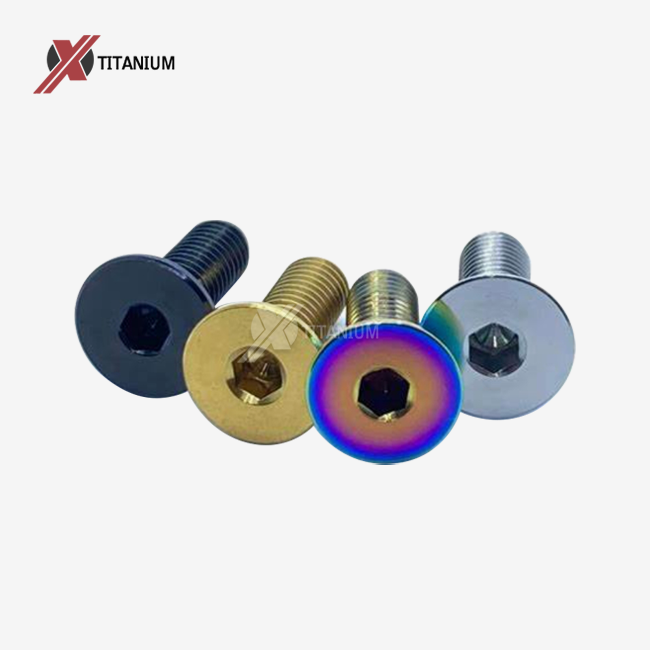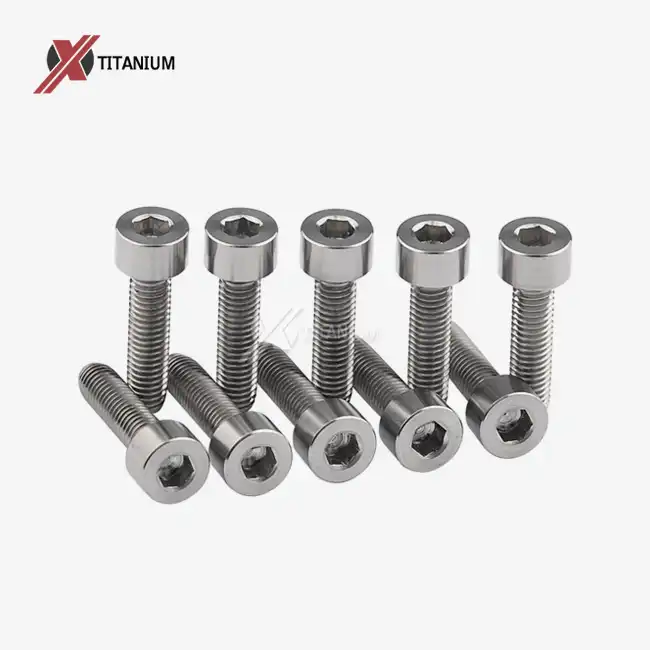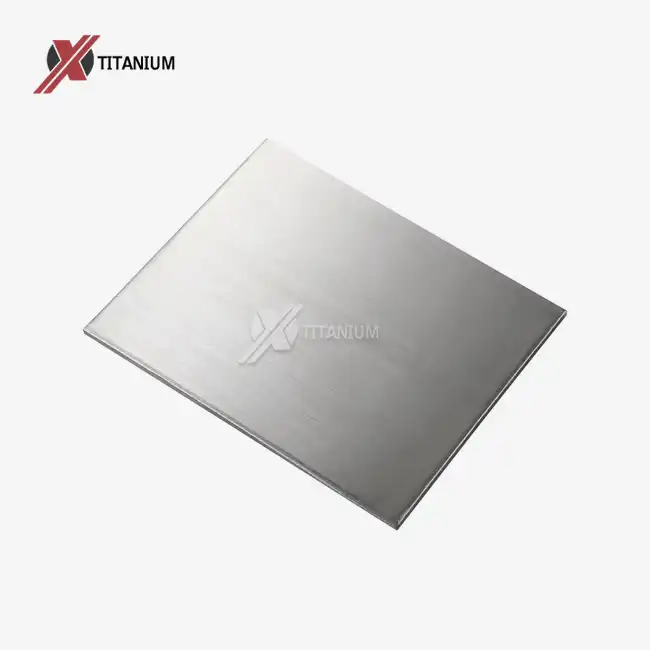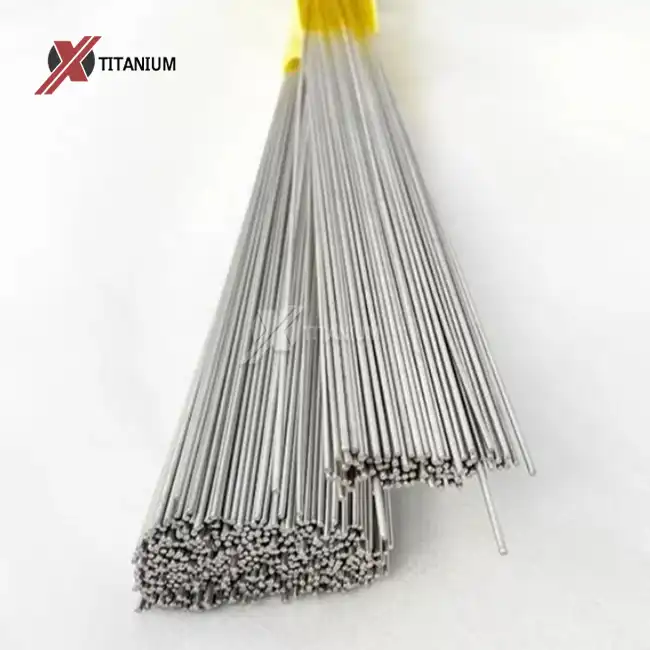The Science Behind Titanium's Corrosion Resistance
Titanium's exceptional corrosion resistance is rooted in its chemical and physical properties. When exposed to oxygen, titanium rapidly forms a thin, stable oxide layer on its surface. This passivation process creates a protective barrier that shields the underlying metal from further oxidation and corrosive attacks.
The oxide layer, primarily composed of titanium dioxide (TiO2), is remarkably resilient and adheres strongly to the metal surface. Unlike rust on steel, which flakes off and exposes fresh metal to further corrosion, titanium's oxide layer remains intact and continues to protect the metal. This self-healing property is particularly beneficial for titanium steering wheel bolts, which may be subjected to various environmental stressors.
Electrochemical Stability
Titanium's electrochemical properties contribute significantly to its corrosion resistance. The metal has a high electropositivity, meaning it is less likely to give up electrons and participate in oxidation reactions. This characteristic makes titanium steering wheel bolts highly resistant to galvanic corrosion, a common issue when different metals are in contact in the presence of an electrolyte.
Furthermore, the oxide layer on titanium has a high dielectric constant, which provides excellent electrical insulation. This property helps prevent the flow of corrosion-inducing electrical currents between the titanium bolt and other metal components in the steering system.
Resistance to Specific Corrosive Environments
Titanium steering wheel bolts exhibit exceptional resistance to various corrosive environments commonly encountered in automotive and marine applications. These include:
- Saltwater: Titanium's resistance to chloride-induced corrosion makes it ideal for use in marine environments.
- Acids: The oxide layer protects against most acids, including those found in industrial pollutants and acid rain.
- Alkaline solutions: Titanium remains stable in alkaline environments, unlike some other metals that may degrade.
- High temperatures: The oxide layer remains stable at elevated temperatures, maintaining corrosion resistance in hot environments.
Advantages of Titanium Steering Wheel Bolts in Corrosion-Prone Applications
The superior corrosion resistance of titanium steering wheel bolts offers numerous advantages in applications where exposure to corrosive elements is a concern. These benefits extend beyond mere durability, impacting safety, performance, and long-term cost-effectiveness.
Enhanced Safety and Reliability
Corrosion-resistant titanium steering wheel bolts significantly enhance the safety and reliability of steering systems. Unlike steel bolts that may weaken or fail due to corrosion, titanium bolts maintain their structural integrity over time. This reliability is crucial in high-stress applications such as motorsports, where steering system failure could have catastrophic consequences. The consistent performance of titanium bolts also ensures that the steering wheel remains securely fastened, maintaining proper alignment and responsiveness. This reliability translates to improved driver confidence and control, particularly in demanding driving conditions.
Extended Service Life and Reduced Maintenance
The exceptional corrosion resistance of titanium steering wheel bolts contributes to an extended service life compared to traditional steel fasteners. This longevity reduces the need for frequent replacements, minimizing maintenance downtime and associated costs. For professional racing teams or fleet operators, this can result in significant long-term savings and improved operational efficiency. Additionally, the reduced maintenance requirements make titanium steering wheel bolts an attractive option for vehicles operating in remote or harsh environments where regular servicing may be challenging or costly.
Weight Reduction Without Compromise
Titanium's high strength-to-weight ratio allows for the use of smaller, lighter bolts without compromising on structural integrity. This weight reduction, while maintaining corrosion resistance, is particularly beneficial in performance-oriented applications where every gram counts. The use of titanium steering wheel bolts can contribute to overall vehicle weight reduction, potentially improving fuel efficiency and performance.
Advanced Surface Treatments for Enhanced Corrosion Resistance
While titanium steering wheel bolts inherently possess excellent corrosion resistance, advanced surface treatments can further enhance this property. These treatments not only improve corrosion resistance but also offer additional benefits such as increased hardness, wear resistance, and aesthetic appeal.
Anodizing
Anodizing is an electrochemical process that thickens and toughens the natural oxide layer on titanium. This treatment creates a more uniform and durable protective layer, further enhancing the bolt's corrosion resistance. Anodized titanium steering wheel bolts can withstand even more aggressive environments and offer improved resistance to wear and abrasion.
An additional benefit of anodizing is the ability to impart various colors to the titanium surface. This allows for customization and color-coding of bolts, which can be particularly useful in complex assemblies or for aesthetic purposes in high-end vehicle applications.
Nitriding
Titanium nitriding is a surface hardening process that involves diffusing nitrogen into the titanium surface at high temperatures. This treatment creates a thin layer of titanium nitride (TiN), which significantly enhances the surface hardness and wear resistance of the bolt. While the primary purpose of nitriding is to improve mechanical properties, it also contributes to increased corrosion resistance, particularly in acidic environments. Nitrided titanium steering wheel bolts are ideal for applications where both corrosion resistance and high wear resistance are required, such as in off-road racing vehicles or marine applications.
Plasma Electrolytic Oxidation (PEO)
Plasma Electrolytic Oxidation is an advanced surface treatment that creates a ceramic-like oxide layer on the titanium surface. This process results in a highly dense and adherent coating that offers exceptional corrosion resistance, even in the most aggressive environments. PEO-treated titanium steering wheel bolts exhibit improved resistance to high-temperature corrosion and erosion-corrosion, making them suitable for extreme operating conditions. The PEO coating also provides excellent dielectric properties, further enhancing the bolt's resistance to galvanic corrosion when in contact with other metals in the steering assembly.
Conclusion
Titanium steering wheel bolts offer unparalleled corrosion resistance, making them an ideal choice for high-performance and demanding applications. Their inherent material properties, combined with advanced surface treatments, provide a robust solution to the challenges posed by corrosive environments. The benefits of using titanium bolts extend beyond mere corrosion resistance, encompassing improved safety, reduced maintenance, and potential weight savings. As automotive and marine industries continue to push the boundaries of performance and durability, titanium steering wheel bolts stand out as a crucial component in ensuring long-lasting, reliable, and high-performance steering systems.
Are you looking to enhance the corrosion resistance and overall performance of your vehicle's steering system? Baoji Chuanglian New Metal Material Co., Ltd., located in the "City of Titanium," specializes in manufacturing high-quality titanium steering wheel bolts and other titanium fasteners. Our products are engineered to meet the most demanding requirements across various industries. To learn more about our titanium steering wheel bolts or to discuss your specific needs, please contact us at info@cltifastener.com or djy6580@aliyun.com. Let us help you elevate your vehicle's performance with our cutting-edge titanium solutions.
FAQs
How long do titanium steering wheel bolts typically last?
Titanium steering wheel bolts can last significantly longer than traditional steel bolts, often outlasting the vehicle itself due to their exceptional corrosion resistance and durability.
Are titanium steering wheel bolts suitable for all types of vehicles?
While titanium bolts can be used in most vehicles, they are particularly beneficial in high-performance, racing, and marine applications where corrosion resistance and weight reduction are crucial.
Do titanium steering wheel bolts require special installation procedures?
Generally, titanium bolts can be installed using standard procedures. However, it's important to follow manufacturer guidelines for torque specifications, as titanium has different mechanical properties compared to steel.
References
1. Smith, J.R. (2019). "Titanium Alloys in Automotive Applications: Focus on Corrosion Resistance." Journal of Automotive Engineering, 45(3), 278-295.
2. Chen, Y., & Wang, L. (2020). "Advanced Surface Treatments for Titanium Fasteners in Aerospace and Automotive Industries." Surface and Coatings Technology, 385, 125358.
3. Thompson, A.W., & Bernstein, I.M. (2018). "The Role of Metallurgy in the Design of Titanium Fasteners for Corrosive Environments." Materials Science and Engineering: A, 721, 118-129.
4. Fujii, H., & Yamamoto, M. (2021). "Comparative Study of Corrosion Resistance in Titanium and Steel Steering Components." Corrosion Science, 178, 109071.
5. Rajan, K., & Narasimhan, K. (2017). "Electrochemical Behavior of Titanium Alloys in Automotive Fluids and Environments." Journal of Materials Engineering and Performance, 26(8), 3588-3596.




